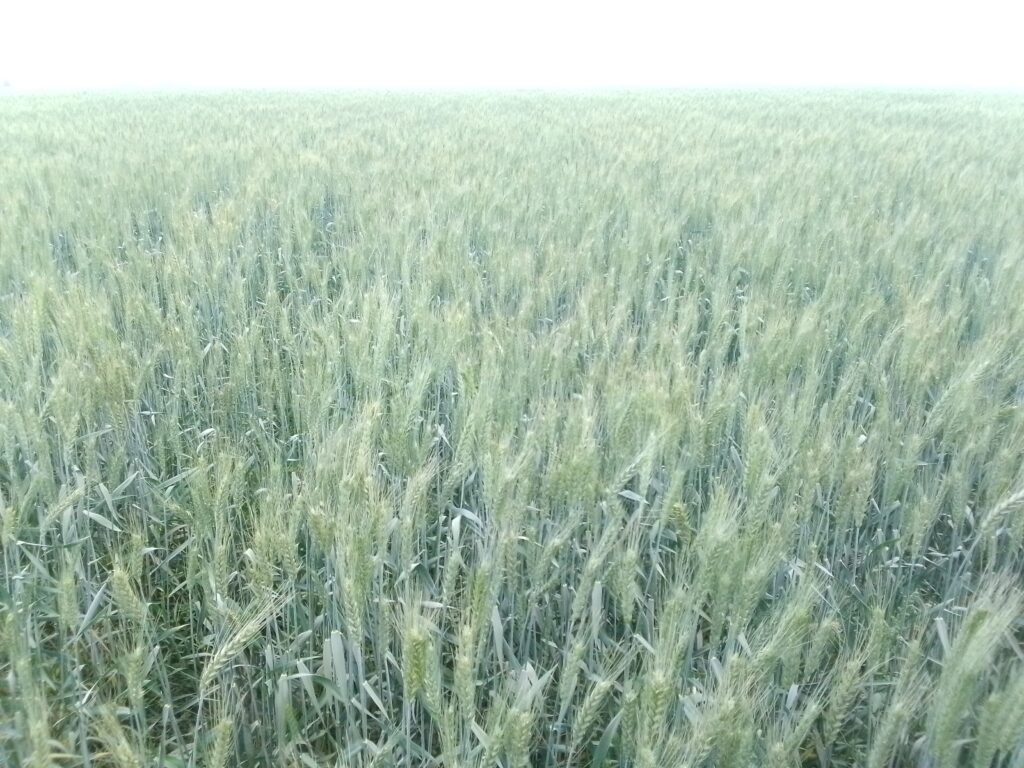No fewer than six thousand wheat farmers in Nigeria are expecting a bumper harvest following interventions in seed quality and good agricultural practices by Technologies for African Agricultural Transformation (TAAT) programme, Flour Milling Association of Nigeria (FMAN), Lake Chad Research Institute (LCRI) and other partners.
A recent visit to a wheat farm at Kura village in Kano, Nigeria, as part of activities for a two-day workshop on wheat revolution in Nigeria, captured the expectations and experiences of the farmers.
Abdulhamid Saleh Mudawa is a two hectare wheat farmer in Kura, Kano. He shared his experiences on how access to quality, heat-tolerant wheat seed can facilitate a wheat revolution geared towards self-sufficiency.
“I am expecting to harvest at least a hundred and twenty bags of wheat from this farm as you can see”.

“Before now, I was struggling to cultivate between fifty to sixty bags, but the introduction of this heat-tolerant seed with high-yielding ability has brought about a change”.
“The story is the same with other farmers who are also benefiting from this project. It has significantly impacted our income; we are making more money now”.
“Aside the revenue it generates for me, it has also become a major food in my home which we process to make various meals”.
“Other farmers yet to adopt this seed variety are encouraged to do so, and I guarantee they will also give the same testimony. We solicit more support for seeds and other necessary farm tools to aid our farming”, he added.
Why we are promoting the Borlaug seed variety
Ahmad Tijjani Abdullahi, an agronomist with FMAN, affirmed that the choice of the Borlaug wheat seed for Nigerian farmers is connected to its high-yielding nature and heat-tolerant ability, amongst other features.

“This variety can give a farmer four to seven tons per hectare and in terms of quality for baking, its second to none, this is why F-MN is interested in promoting it among the Nigerian farmers”.

“Currently, the over six thousand farmers on our list are producing over eight thousand hectares across seven states of Kano, Jigawa, Kaduna, Bauchi, Sokoto, Kebbi and Zamfara”.
“It is important to state that, there is a high increase in demand for wheat food product globally and Nigeria is not an exception”.
“That is why we must do everything possible to increase the percentage of what we are producing to meet up to the demand as such, government must redouble its support for this project to close the wide gap of importing what we consume”.
We are Optimistic Nigeria will soon achieve food sufficiency – TAAT
Dr Solomon Gizaw, Head TAAT Clearinghouse, said he is optimistic the country (Nigeria) will attain food sufficiency soon.
According to him, there is now a great policy shift putting agriculture as a priority which is the driving force to achieving the goal and the reason why TAAT is advocating for policy consistency on the part of the Government.

“At TAAT, we believe we can produce almost all the food we need, we have the land, technology and the people but unfortunately Nigeria is one of the largest food importers in the world”.
“We want to change this narrative; that is why Technologies for African Agricultural Transformation (TAAT) is getting the Government involved, providing farmers with technologies and linking them to the markets”.
“With all the vast lands in Nigeria, ninty five (95) percent of wheat consumed in Nigeria comes from abroad costing over five billion dollars”.
“This is a challenge we must address, and we are glad the government and other stakeholders are now coming together to form a strong alliance and cooperation towards making the goal a reality”.
“I remain very hopeful that with the level of cooperation we are now seeing, Nigeria and, by extension, Africa can achieve self-sufficiency in wheat as well as other needed crops for its populace”, Dr Gizaw added.

